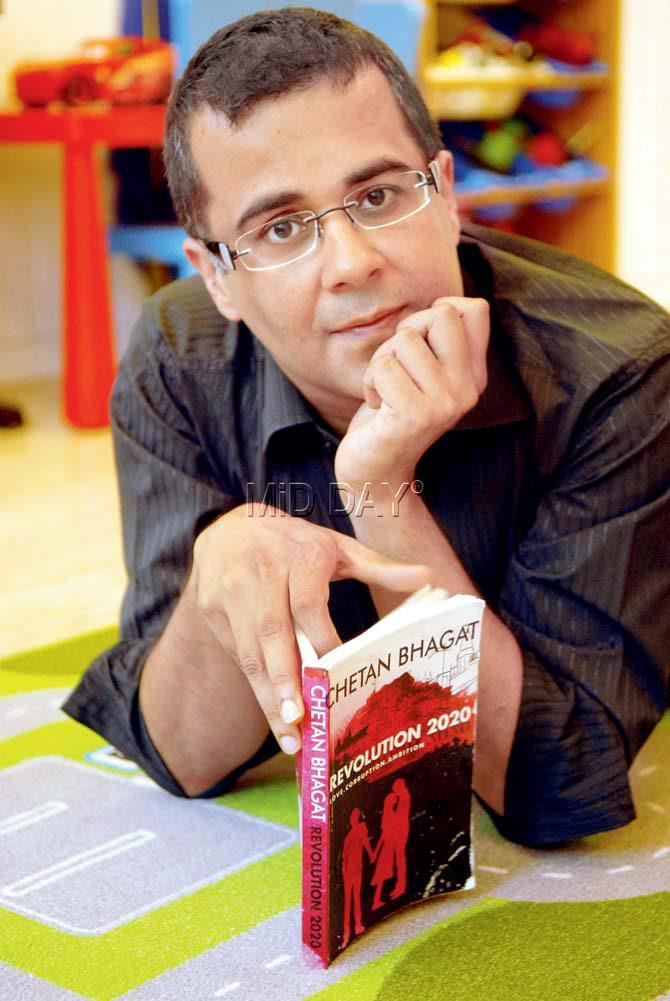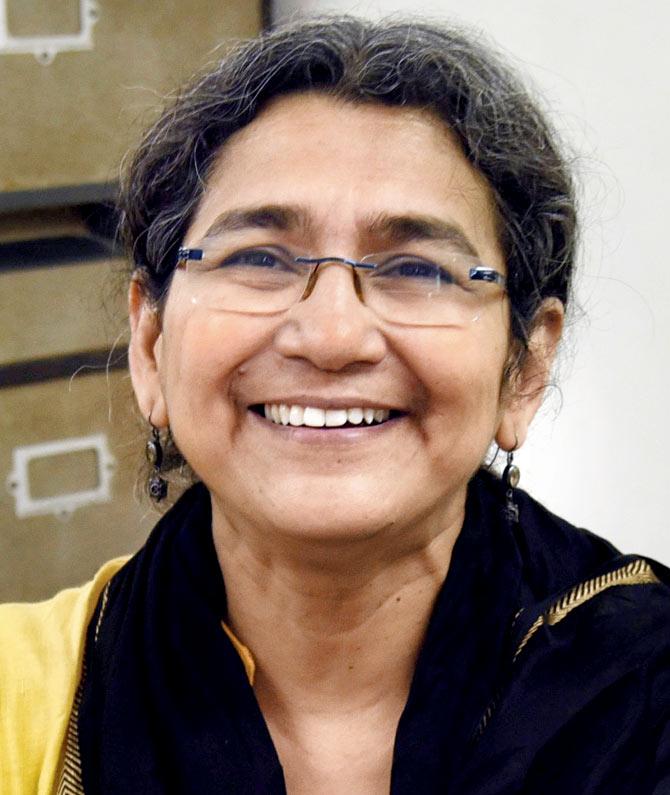When a Chetan Bhagat novel listed in a syllabus creates a stir, it's time to ask, is the problem with popular fiction in literature courses or is it just Five Point Someone?


Pic/Pradeep Dhivar
You fall in love, but her father is your teacher. You qualify for an institution filled with high IQ individuals, but it wants to break you. You fulfil your dream, but it falls short of the ideal. You are neither the best nor the worst, sitting somewhere in the middle, and at risk of being forgotten by history.
ADVERTISEMENT
If you distil Chetan Bhagat's bestseller, Five Point Someone: What not to do at IIT, its grand themes - love and rebellion, for instance - are not the kinds that can fall easily out of fashion. Three years after it was published in 2004, Five Point Someone sold a million copies, a figure that surpassed the roughly 5,000-copies-sold benchmark for Indian bestsellers. It spoke to the aspirational 20-something Indian middle-class which wanted a Bollywood dream by the time it turned 30 - a seven-figure salary, a Green Card holder, the love of your life, and to quit engineering and finally pursue your passions.
When Amish Tripathi, who authored the Hindu theology inspired Shiva Trilogy, read Five Point Someone a few years ago, he found that "it certainly connected to those from a humble background - those who had to fight hard and cope with academic pressure. At the back of your head, you always remembered how your parents had made several sacrifices for you."
Yet, last week, when Five Point Someone popped up in a syllabus revision proposal for an undergrad elective on Popular Fiction drafted by the syllabus committee of Delhi University (DU), social media and academics were flabbergasted. The usual jibes that Bhagat has been subject to over the last decade continued to dominate social media. As people rued the seemingly poor choice, Bhagat got back at the mocking tribe with a tweet: 'Elitistaan theories trying to diss me and literary value of my books have failed miserably with DU adding my books to their course. Sorry.'
Bhagat's works are polarising and often slip into debates of the elite versus the masses, but academicians have a more nuanced understanding of the place of popular fiction in courses. "We don't object to teach popular literature," says Dr Swati Moitra, an assistant professor of English Literature at Miranda House, New Delhi. "With a text like Five Point Someone, we mostly draw lessons on how not to write. The problem is not that he writes commercial bestsellers but that there is not much to teach about the text, nothing much to celebrate. He speaks to an aspiring middle class, but, as a professor, I can only teach 'around' the text," she says.
Moitra, like many of her peers, is baffled by the choice of Five Point Someone, which shares space with JK Rowling and Agatha Christie in the proposed syllabus. The elective used to have Issac Asimov, Ian Fleming and Lewis Carroll, and is meant for students pursuing BA (Hons) in other faculties, apart from English, at DU. It was designed to cover the range that popular fiction constitutes, such as thrillers, science fiction and children's writing.
"The issue is not elitism but how the syllabus has been constituted," she says when we ask her if Bhagat will ever find a place in Indian Writing in English, a compulsory paper (usually constituted of writing that is avowedly 'literary') in universities across India. "A syllabus can accommodate only so much and with coherence. The BA (Hons) in English Literature at DU, for example, has a short story by Salman Rushdie but not his novels," she says.

Dr Mitra Mukherjee-Parikh, Head, Department of English, SNDT
Not the first time
While Bhagat, who has had many a Twitter spat with Rushdie in the past on literary worth and mass appeal, may be thrilled to find his work on a syllabus, this is not the first time, as it turns out.
Nearly a decade ago, Mumbai's SNDT University introduced Five Point Someone as part of a Popular Fiction paper for MA English. The paper was divided into Western and Indian works, with titles such as The 65 Lakh Heist by Hindi thriller genius Surendra Mohan Pathak and Tamil pulp fiction in it. Dr Mitra Mukherjee-Parikh, head of the department at SNDT, says, "In the last 30 or 40 years, there has been a major change in the way we approach canonised literature - that with a capital L."
One of the ways by which this "anti-foundational and anti-evaluation" approach works is to include popular fiction, which, as Mukherjee-Parikh points out, were once received with smugness and prejudice. "Including works of popular fiction is not a tokenist approach but to make students question a sacrosanct idea of literature," she says, adding, "Popular writing is a way of entering the reality of a milieu. One could say that both Amitav Ghosh [whose novels are routinely studied in papers on Indian Writing in English and Post-Colonial Studies] and Bhagat are looking at the world around them, only they differ in the use of their language. 'Popular' is quite tough; you have to look beyond the easy laughs to appreciate it."
The decision to include Five Point Someone in the syllabus, Mukherjee-Parikh reminisces, came from observing several young women and teens reading it during their daily train commute. "I can't say I am a fan of Five Point Someone. He takes on issues too simply in most parts of the book. That said, I personally feel there is a protracted effort from him to identify and isolate a question for the middle class mind," she says.

Dr Swati Moitra, Asst. Professor, Miranda House, New Delhi
Beyond Bhagat
On May 1, English Literature faculty in the DU are expected to respond to the proposed revision. Academicians feel that the controversy surrounding the syllabus revision falls short of asking the right questions and resorts to easy debates about literary pedigree. Even within popular fiction, there is a whole range from India - perhaps not as diverse as that from the UK -that is available, such as Tripathi and Devdutt Pattanaik's works that draw on Indian mythology or Anuja Chauhan's chick lit titles that contest Indian patriarchy. Then there is a whole world of translated popular fiction available in regional literatures across India. Parikh warns that we are getting stuck in passe and conventional ideas of popular fiction without paying attention to online publishing platforms. Fan fiction and blogs, for instance, have a mass appeal too.
However, doesn't the phenomenon of a fast-paced novel selling a million copies merit discussion in a classroom? The novelist and critic Amit Chaudhuri, who's also Professor of Contemporary Literature at the University of East Anglia, UK, says that a book may or may not sell in huge numbers, but that is not what makes it worthy or unworthy of study. "These days, we measure even serious literature by commercial parameters. That is not how we take pleasure in reading and yet it's how we seem to decide if a book is important," he says, adding, "Has Chetan Bhagat - whom I haven't read - achieved something in imaginative terms that merits study? - that's a more valid question [than his popularity]." He goes one step further: Instead of Agatha Christie, why not study novelist Raymond Chandler, who scripted the hit film noir work, Double Indemnity? Instead of Rowling, why not Seinfeld?"
We wonder what Bhagat, who was busy promoting one of his novels in New York when we tried reaching him, has to say about this. But, this much is true: Bhagat is not just any forgettable Five Point Someone.
 Subscribe today by clicking the link and stay updated with the latest news!" Click here!
Subscribe today by clicking the link and stay updated with the latest news!" Click here!







